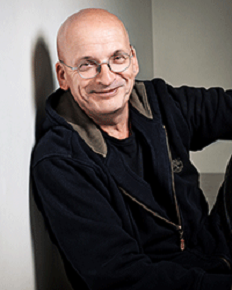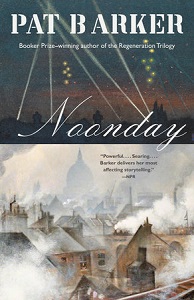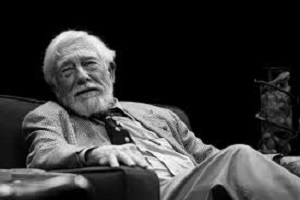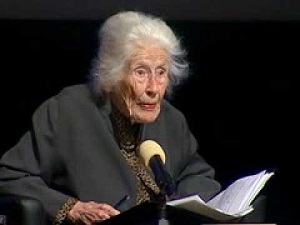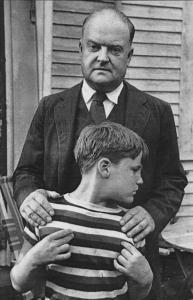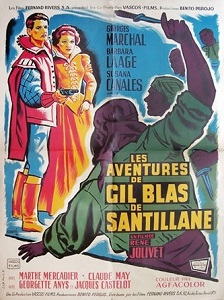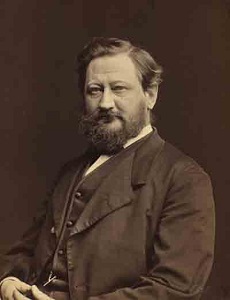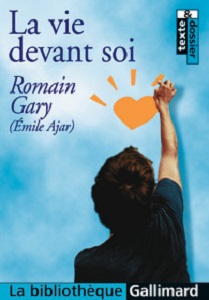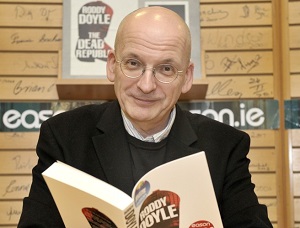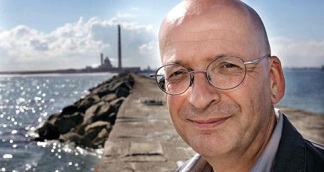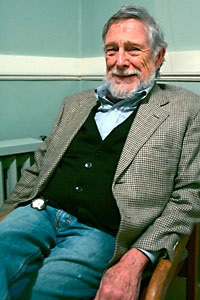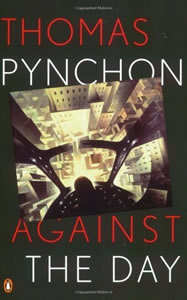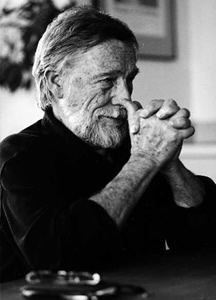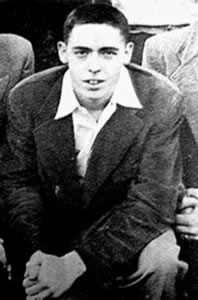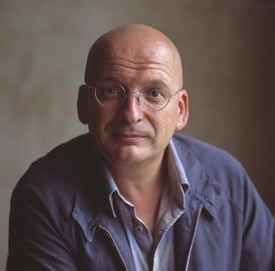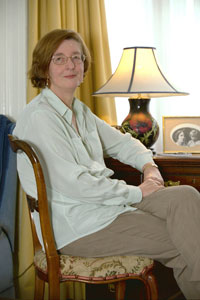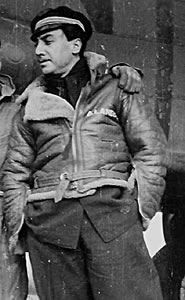Dolce far niente
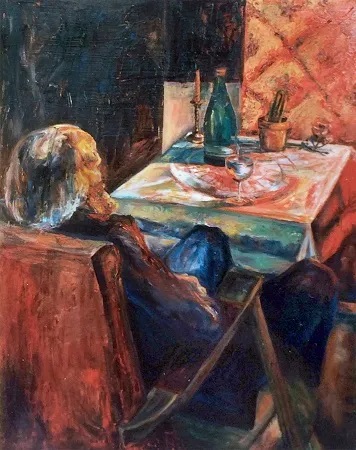
My Rocking-Chair
When I am old and worse for wear
I want to buy a rocking-chair,
And set it on a porch where shine
The stars of morning-glory vine;
With just beyond, a gleam of grass,
A shady street where people pass;
And some who come with time to spare,
To yarn beside my rocking-chair.
Then I will light my corn-cob pipe
And dose and dream and rarely gripe.
My morning paper on my knee
I won’t allow to worry me.
For if I know the latest news
Is bad,–to read it I’ll refuse,
Since I have always tried to see
The side of life that clicks with glee.
And looking back with days nigh done,
I feel I’ve had a heap of fun.
Of course I guess that more or less
It’s you yourself make happiness
And if your needs are small and few,
Like me you may be happy too:
And end up with a hope, a prayer,
A chuckle in a rocking-chair.

Robert W. Service (16 januari 1874 – 11 september 1958)
St. John’s Minster in Preston, Lancashire, de geboorteplaats van Robert W. Service
De Ierse schrijver Roddy Doyle werd geboren in Dublin op 8 mei 1958. Zie ook alle tags voor Roddy Doyle op dit blog.
Uit: The Snapper
“–It’s shockin’, said Jimmy Sr again,—so it is. Wha’ do you think o’ this?
He was talking to Veronica.
–I don’t know, said Veronica.
–Is tha’ the best yeh can do, Veronica?
–Well, what do YOU think?
Jimmy Sr creased his face and held it that way for a second.
–I don’t know, he said.—I should give ou’, I suppose. An’ throw a wobbler or somethin’. But—what’s the point?
Veronica nodded. She looked very tired now.
Jimmy Sr continued.
–If she was—
He turned to Sharon.
–You should’ve come to us earlier—before, yeh know—an’ said you were goin’ to get pregnant.
The three of them tried to laugh.
–Then we could’ve done somethin’ abou’ it.—My God, though.
No one said anything. Then Jimmy Sr spoke to Sharon again.
–You’re absolutely sure now? Positive?
–Yeah, I am. I done—
–Did, said Veronica.
–I did the test.
–The test? said Jimmy Sr.—Oh.—Did yeh go in by yourself?
–Yeah, said Sharon.
–Did yeh? Fair play to yeh, said Jimmy Sr.—I’d never’ve thought o’ tha’.
Sharon and Veronica looked at each other, and grinned quickly.
Jimmy Sr got down to business.
–Who was it?
–Wha’?—Oh. I don’t know.
–Ah now, Jaysis—!
–No, I do know.
–Well, then?
–I’m not tellin’.
Jimmy Sr could feel himself getting a bit angry now. That was better.”
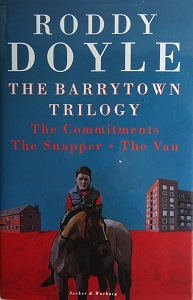
Roddy Doyle (Dublin, 8 mei 1958)
Cover
De Amerikaanse schrijver Thomas Pynchon werd op 8 mei 1937 geboren in Glen Cove, Long Island, New York. Zie ook alle tags voor Thomas Pynchon op dit blog.
Uit: V
“Beatrice brought beer. There was a piercing yelp from one of the back tables, she flinched, beer slopped over the edge of the glass. “God,” she said, “it’s Ploy again.” Ploy was now an engine-man on the mine sweeper Impulsive and a scandal the length of East Main. He stood five feet nothing in sea boots and was always picking fights with the biggest people on the ship, knowing they would never take him seriously. Ten months ago (just before he’d transferred off the Scaffold) the Navy had decided to remove all of Ploy’s teeth. Incensed, Ploy managed to punch his way through a chief corpsman and two dental officers before it was decided he was in earnest about keeping his teeth. “But think,” the officers shouted, trying not to laugh, fending off his tiny fists: “root canal work, gum abscesses….” “No,” screamed Ploy.
They finally had to hit him in the bicep with a Pentothal injection. On waking up, Ploy saw apocalypse, screamed lengthy obscenities. For two months he roamed ghastly around the Scaffold, leaping without warning to swing from the overhead like an orangutan, trying to kick officers in the teeth. He would stand on the fantail and harangue whoever would listen, flannelmouthed through aching gums. When his mouth had healed he was presented with a gleaming, regulation set of upper and lower plates. “Oh God,” he bawled, and tried to jump over the side. But was restrained by a gargantuan Negro named Dahoud. “Hey there, little fellow,” said Dahoud, picking Ploy up by the head and scrutinizing this convulsion of dungarees and despair whose feet thrashed a yard above the deck. “What do you want to go and do that for?” “Man, I want to die, is all,” cried Ploy. “Don’t you know,” said Dahoud, “that life is the most precious possession you have?” “Ho, ho,” said Ploy through his tears. “Why?” “Because,” said Dahoud, “without it, you’d be dead.” “Oh,” said Ploy. He thought about this for a week. He calmed down, started to go on liberty again. His transfer to the Impulsive became reality. Soon, after Lights Out, the other snipes began to hear strange grating sounds from the direction of Ploy’s rack. This went on for a couple-three weeks until one morning around two somebody turned on the lights in the compartment and there was Ploy, sitting crosslegged on his rack, sharpening his teeth with a small bastard file. Next payday night, Ploy sat at a table in the Sailor’s Grave with a bunch of other snipes, quieter than usual. Around eleven, Beatrice swayed by, carrying a tray full of beers. Gleeful, Ploy stuck his head out, opened his jaws wide, and sank his newly filed dentures into the barmaid’s right buttock. Beatrice screamed, glasses flew parabolic and glittering, spraying the Sailor’s Grave with watery beer. It became Ploy’s favorite amusement.”
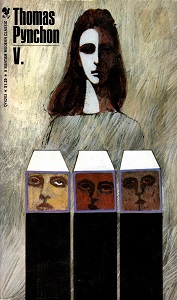
Thomas Pynchon (Glen Cove, 8 mei 1937)
De Engelse schrijfster Pat Barker werd geboren in Thornaby-on-Tees op 8 mei 1943. Zie ook alle tags voor Pat Barker op dit blog.
Uit: Noonday
“Closing the front door quietly behind her, Elinor took a moment to absorb the silence. Facing her, directly opposite the front door, where nobody could possibly miss it, was a portrait of her brother, Toby, in uniform. It had been painted, from photographs, several years after his death and was frankly not very good. Everybody else seemed to like it, or at least tolerate it, but Elinor thought it was a complete travesty. Item: one standard-issue gallant young officer, Grim Reaper for the use of. There was nothing of Toby there at all. Nigel Featherstone was the artist: and he was very well regarded; you saw his portraits of judges, masters of colleges, politicians and generals everywhere, but she’d never liked his work. Her own portrait of Toby was stronger – not good, she didn’t claim that – but certainly better than this. She resented not having been asked to paint this family portrait: his own sister, after all. And every visit to her sister’s house began with her standing in front of it. When he was alive, Toby’s presence had been the only thing that made weekends with the rest of her family bearable. Now, this portrait – that blank, lifeless face – was a reminder that she was going to have to face them alone.
She caught the creak of a leather armchair from the open door on her left. Oh, well, better get it over with. She went into the room and found Tim, her brother-in-law, sitting by the open window. As soon as he saw her he stood up and let his newspaper slide, sighing, to the floor. `Elinor.’ He pecked her proffered cheek. ‘Too early for a whisky?’ Evidently it wasn’t: there was a half-empty glass by his side. She opened her mouth to refuse but he’d already started to pour. ‘How was the train?’ `Crowded. Late.’ ‘Aren’t they all?’ When she’d first met Tim he might’ve been a neutered tomcat for all the interest he aroused in her. She’d thought him a nonentity, perhaps influenced in that – as in so much else – by Toby, who hadn’t liked Tim, or perhaps hadn’t found much in him to either like or dislike. And yet Tim had gone on to be a successful man; powerful, even. Something in Whitehall, in the War Office. Which was strange, because he’d never actually seen active service.”
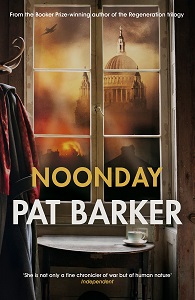
Pat Barker (Thornaby-on-Tees, 8 mei 1943)
Cover
De Amerikaanse dichter Gary Snyder werd geboren op 8 mei 1930 in San Francisco. Zie ook alle tags voor Gary Snyder op dit blog.
Night Song of the Los Angeles Basin
Owl
calls,
pollen dust blows
Swirl of light strokes writhing
knot-tying light paths,
calligraphy of cars.
Los Angeles basin and hill slopes
Checkered with streetways. Floral loops
Of the freeway express and exchange.
Dragons of light in the dark
sweep going both ways
in the night city belly.
The passage of light end to end and rebound,
—ride drivers all heading somewhere—
etch in their traces to night’s eye-mind
calligraphy of cars.
Vole paths. Mouse trails worn in
On meadow grass;
Winding pocket-gopher tunnels,
Marmot lookout rocks.
Houses with green watered gardens
Slip under the ghost of the dry chaparral,
Ghost
shrine to the L. A. River
The jinja that never was there
is there.
Where the river debouches
the place of the moment
of trembling and gathering and giving
so that lizards clap hands there
—just lizards
come pray, saying
“please give us health and long life.”
A hawk,
a mouse.
Slash of calligraphy of freeways of cars.
Into the pools of the channelized river
the Goddess in tall rain dress
tosses a handful of meal.
Gold bellies roil
mouth-bubbles, frenzy of feeding,
the common ones, the bright-colored rare ones
show up, they tangle and tumble,
godlings ride by in Rolls Royce
wide-eyed in brokers’ halls
lifted in hotels
being presented to, platters
of tidbit and wine,
snatch of fame,
churn and roil,
meal gone the water subsides.
A mouse,
a hawk.
The calligraphy of lights on the night
freeways of Los Angeles
will long be remembered.
Owl
calls;
late-rising moon.
Changing Diapers
How intelligent he looks!
on his back
both feet caught in my one hand
his glance set sideways,
on a giant poster of Geronimo
with a Sharp’s repeating rifle by his knee.
I open, wipe, he doesn’t even notice
nor do I.
Baby legs and knees
toes like little peas
little wrinkles, good-to-eat,
eyes bright, shiny ears
chest swelling drawing air,
No trouble, friend,
you and me and Geronimo
are men.
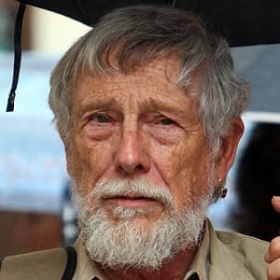
Gary Snyder (San Francisco, 8 mei 1930)
De Duitse schrijver, entertainer, muzikant, acteur en clubeigenaar Rocko Schamoni (pseudoniem van Tobias Albrecht) werd geboren op 8 mei 1966 in Lütjenburg. Zie ook alle tags voor Rocko Schamoni op dit blog.
Uit: Fünf Löcher Im Himmel
„Ab und zu blieb er stehen, um die Hand am Koffergriff zu wechseln. Er bog in eine Seitengasse ein, lief sie hinunter, beobachtete schweigend die Häuser und Wohnungen, an denen er vorbeikam, die Kneipen und Läden und die überall geparkten Autos. Sein Gesichtsausdruck blieb regungslos. Straße für Straße lief er hinunter und Viertel für Viertel, manchmal setzte er sich für einen Moment auf eine Bank oder eine Mauer, rauchte eine Zigarette und starrte dabei in das Nichts zwischen den Sternen.
Schließlich, nach Stunden, erreichte er den Stadtrand. Die Häuser wurden flacher, es gab kaum noch Geschäfte und Kneipen, nur noch endlose Wohnsiedlungen, von kleinen Straßen und Wegen durchzogen, ab und zu einen Zeitungskiosk, die Außenhaut eines gigantischen Organismus.
Paul kam zu einer Schrebergartensiedlung. Die Nacht war halb vorüber, und es hatte zu nieseln begonnen, langsam zog die feuchte Kälte in seine Kleidung. Er fand eine Hütte, die verlassen aussah, die Parzelle war verwildert, die Gartenpforte hing schief in den Angeln. Vorsichtig betrat er das Grundstück, das von einer hohen Buchsbaumhecke umgeben war, und arbeitete sich zur Eingangstür der Hütte vor. Sie war verschlossen. Paul lehnte sich langsam, aber mit dem ganzen Gewicht seines Körpers dagegen und hielt den Griff gedrückt, irgendwann hörte er ein knackendes Geräusch, das morsche Holz des Türrahmens gab nach, und Paul trat ein. Er leuchtete mit dem Feuerzeug in den Raum. Vor ihm lag ein ziemlich verwahrlostes, kleines, aber komplett eingerichtetes Zimmer. Er schloss die Tür hinter sich und zündete die Kerze an, die auf einem Campingtisch in der Mitte des Raumes stand. Er setzte sich auf das Sofa dahinter und atmete tief durch. Eine Weile beobachtete er den Dunst, den seine Atemluft in der Kälte bildete, dann schlief er ein, und sein Kopf sank auf die Brust.
Ein Knurren weckte Paul. Er schlug die Augen auf. Ein paar Sonnenstrahlen schienen ihm durch das verstaubte Wohnzimmerfenster ins Gesicht. Es knurrte wieder, hell und unangenehm rasselnd. Langsam griff Paul nach dem Messer in seiner Manteltasche, er öffnete die Klinge mit dem Daumen und zog es vorsichtig heraus. Dann beugte er sich vor, um den Raum überblicken zu können. In der Ecke neben dem Kühlschrank hockte ein Tier, er konnte es im Schatten kaum erkennen, vielleicht ein Marder. Langsam erhob sich Paul und griff dabei mit der anderen Hand nach einem schweren gläsernen Aschenbecher vor ihm auf dem Tisch. Der Marder knurrte, bewegte seinen Kopf drohend vor und zurück. Je näher Paul kam, desto nervöser wurde das Tier, langsam hob er die Hand mit dem Aschenbecher, doch plötzlich brach der Marder fauchend aus der Ecke hervor, sprang blitzschnell an ihm hinauf, biss wütend in den Mantel und stürzte quiekend durch den Raum und unter das Sofa. Nervöses Geraschel war zu hören, dann herrschte für einige Sekun-den absolute Ruhe. Vorsichtig hob Paul mit der linken Hand das Sofa an, in der anderen hielt er den Aschenbecher. Aber der Marder war verschwunden. Paul durchsuchte die Schränke nach etwas Essbarem, er fand ein paar alte Teebeutel und zwei abgelaufene Konservendosen mit Erbsensuppe, die er sich auf dem Herd aufwärmte. Er sah sich ein bisschen um, entdeckte eine elektrische Heizung und drehte sie auf.“
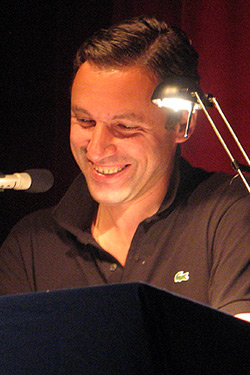
Rocko Schamoni (Lütjenburg, 8 mei 1966)
De Nederlandse dichter en essayist Gerrit Kamphuis werd geboren in Zwolle op 8 mei 1906. Zie ook alle tags voor Gerrit Kamphuis op dit blog.
Veronica’s Doek
Dit hoofd. bloedrig bezweet en vuil,
de starend-groote schrik der oogen
en stekels scheurend in het hooge
Voorhoofd, verminkt door schram en buil.
Geen deernis en geen mededoogen,
afschuw van zooveel walglijk leed
Is in het neerslaan onzer oogen.
Maar God, waarom voor hem zoo wreed,
terwijl met ons Gij waart bewogen?
Doch geen, die uw geheimen weet
dan dat: Gij zijt met ons bewogen.
Twee vrienden
Het luide licht zweeg tot een schaduw grijs
En loom. De avond hief de donkre hulling
Van zijn mantel. En traag werd de vervulling
Der dingen stil, en ’t zong een zachte wijs.
Wij gingen eenzaam langs het duistre water
En dachten ieder aan het leven om ons heen
En in ons hart; en elk wist zich alleen –
Toen hebben wij gesproken over nu en later.
Maar ’t was vergeefs; het somberdreigend duister
Kon nimmer aan ons moede hart ontgaan –
Later, in een spiegel, zag elk ’t ontdaan
Gelaat en hoorde zijn vervreemd gefluister.
Gerrit Kamphuis (8 mei 1906 – 25 april 1998)
Midden jaren 1920
Zie voor nog meer schrijvers van de 8e mei ook mijn blog van 8 mei 2019 en ook mijn blog van 8 mei 2018 en ook mijn blog van 8 mei 2016 deel 3.

